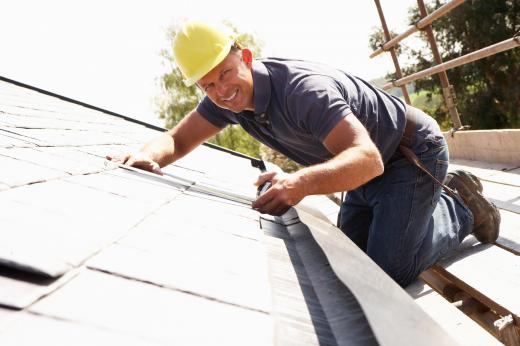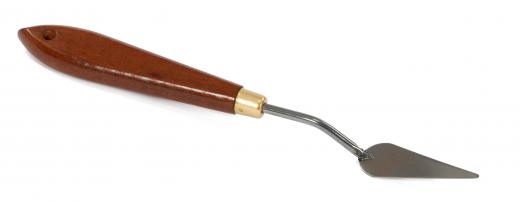Roof mastic is a roofing product used to seal a roof so water cannot penetrate. Several different kinds of products are referred to as mastic; generally speaking, roof mastics are sticky, drying to a flexible, rubbery finish after they are applied and allowed to cure. Many hardware stores carry these products and they can also be ordered by special arrangement. When people are arranging for the replacement or repair of a roof by professionals, they can ask about what products will be used.
One form of roof mastic is a sealer or cement that is used on any area of the roof where water infiltration could occur, such as along the edges of the flashing, at seams and corners, and over nails and screws. It can come in buckets, allowing people to apply it with a palette knife, or in tubes that can be fitted into a caulking gun. When people inspect roofs periodically, it is important to check the areas where mastic has been applied to confirm that it is not pulling away, cracking, or flaking.

Another type of roof mastic is a roof sealant that is designed to be applied to the entire roof, usually in several coats. It can be used to extend the life of a roof by waterproofing it. Mastic can be applied with rollers, sprayers, and other devices. It essentially creates a membrane over the existing roof that resists water penetration and protects the underlying structure. If a roof is badly damaged, mastic cannot repair it, but an aging roof may be coaxed into performing for several more years with a coat of mastic.

In both cases, mastic is designed to be flexible. It will expand and contract without cracking, allowing it to survive variable weather conditions. The waterproofing will last as long as the roof mastic remains elastic and does not crack or chip. It can be tinted with various colors for energy efficiency or to coordinate with an existing paint and roofing scheme. Applying white mastic to a roof can help reflect heat and cut down on cooling bills significantly in hot climates.
Roof mastics are given a rating that estimates how long they will hold up and in what environments. The more UV radiation a roof is exposed to, the more quickly the roof mastic will break down. A roofing professional can provide advice about suitable products and application methods, and inspect a roof to determine whether additional repairs are needed.
Ever since she began contributing to the site several years ago, Mary has embraced the exciting challenge of being a About Mechanics researcher and writer. Mary has a liberal arts degree from Goddard College and spends her free time reading, cooking, and exploring the great outdoors.

